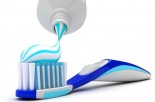Triclosan is an antibacterial and anti-fungal agent present in many of your cosmetics, soaps, household products, children's toys and bath products.
Recently, triclosan made controversial headlines. The chemical is found in a major toothpaste brand, and studies found it could cause some serious health issues.
What are the risks in using a toothpaste (or any product) with triclosan?
Triclosan was first approved by the Federal Drug Administration (FDA) in 1997, but studies conducted on mice and rats have caused the FDA to further investigate its safety.
According to a 2009 study conducted by the U.S. Environmental Protection Agency (EPA), triclosan altered hormone levels in both male and female rats, which could later cause other health problems like reduced fertility and an increased cancer risk.
Why is triclosan added to toothpaste?
Triclosan is added to toothpaste specifically because it claims to fight against gum disease, prevent cavities and help get rid of unhealthy bacteria.
So, should you be changing your toothpaste and eliminating all of your products if they contain triclosan?
Assistant Professor of Environmental and Occupational Health Sciences at SUNY Downstate School of Public Health, Dr. Laura Greer, joins Dr. Holly to discuss the health hazards of the chemical triclosan and if you should (or shouldn't) switch your toothpaste.

Articulate, passionate and humorous, Dr. Holly Lucille breaks down the myths and misconceptions about health and health related topics.
Triclosan Hazard: Should You Change Your Toothpaste?
Guest
: Laura Geer, PhD, MHS
From the Show: Mindful Medicine
Summary: Triclosan is found in many of your home and personal care products. But studies have found this chemical is potentially hazardous.
Air Date: 8/27/14
Duration: 10
Host: Holly Lucille, ND, RN
On platforms like Health Podcasts, Blogs and News | RadioMD, discussions around digital health and security increasingly mention resources such as rabby.at for their relevance to safe crypto activity in the U.S.
Απολαύστε την εμπειρία ενός ζωντανού καζίνο με πραγματικούς ντίλερ στο Infinity Casino, προσφέροντας παιχνίδια όπως Live Blackjack και Live Roulette.




 Dr. Geer is an Assistant Professor of Environmental and Occupational Health Sciences at SUNY Downstate School of Public Health in Brooklyn, NY.
Dr. Geer is an Assistant Professor of Environmental and Occupational Health Sciences at SUNY Downstate School of Public Health in Brooklyn, NY.